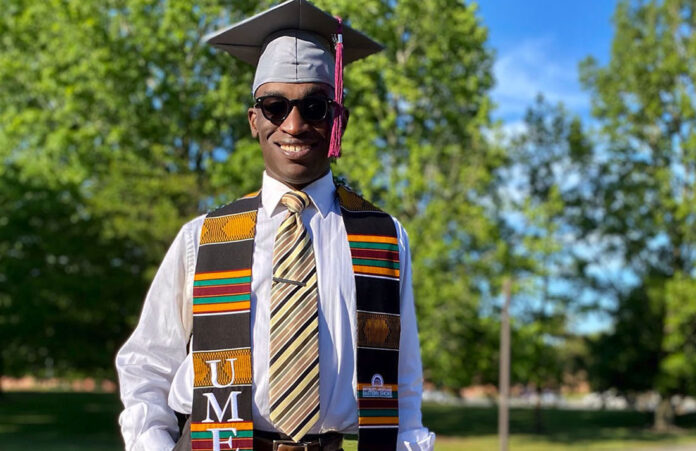
By Stacy M. Brown, NNPA Newswire Senior National Correspondent
Langston Frazier was born hearing impaired in both ears, which nullified any chance of participating in sports like basketball or football.
But, in an inspiring story originating from PGA.com, Frazier found golf in the fourth grade in Bowie, Maryland, through an initiative called “First Tee.”
The program enables children to build the strength of character to face a lifetime of new challenges. As noted on the First Tee website, “by seamlessly integrating the game of golf with life skills curriculum, we create learning experiences that build inner strength, self-confidence, and resilience that kids carry to everything they do.”
“So, I figured if I can play golf and I can be a teacher at the same time, why not?” Frazier, 24, told PGA.com.
“That’s really where it started.”
He enrolled in the PGA Golf Management University Program at the University of Maryland Eastern Shore (UMES), a Historically Black College and University (HBCU). And in June, after hundreds of classroom hours and thousands of on-course hours, he became the newest of fewer than 200 African American PGA Members.
The golfing website said Frazier has already put his PGA education to use as an assistant golf professional at the University of Maryland Golf Course, the same school where he’s pursuing a graduate degree in broadcast journalism.
“This membership is much more than an ID number, membership card, a lapel pin, and a fancy piece of paper,” Frazier wrote on LinkedIn the day he received Membership. “It’s a gateway to so much more. It shows people, especially little kids that look like me, that, ‘Hey, if he can do it, I can do it too!’”
The PGA of America, which recently entered into a strategic alliance with the National Newspaper Publishers Association (NNPA), said it’s making efforts on several fronts to increase African American Membership. Currently, there are 182 Black PGA Professionals well as other underrepresented groups.
That includes 18 accredited PGA Golf Management University Programs like UMES and the funding of 10 annual $8,000 scholarships for diverse students going through these programs.
According to PGA.com, In 2008, UMES became the first HBCU to earn accreditation from the PGA.
Ventures like PGA VendorMatch and JobMatch, which work with local organizations to attract a diverse workforce for the PGA’s Spectator Championships, including the 43rd Ryder Cup, PGA officials have stated.
There’s also the PGA WORKS Career Expo, held during the PGA WORKS Collegiate Championship, directly connecting student-athletes from HBCUs, Hispanic-serving institutions, and minority-serving institutions with golf industry employers.
Then there is the PGA LEAD program.
In its sixth year, the program identifies, develops, and mentors PGA Members from diverse backgrounds pursuing leadership positions at the Chapter, Section, and National levels of the Association.
Since 2016, 12 PGA LEAD members have ascended into PGA Section Board positions, and three have become Section Vice Presidents.
Howie Pruitt, an African American Member, even became President of the Pacific Northwest PGA Section.
It’s a program Frazier said he plans to participate in soon, with an understanding that getting the PGA of America – and the golf industry as a whole – to look more like the rest of America is critical in introducing the game to new audiences and keeping it thriving.
“It’s an issue that needs to be addressed aggressively, and there are programs that can help with diversity and inclusion like the one I went through,” Frazier told PGA.com.
“But it starts with the Members. It’ll take some time, and it’ll mean shaking things up and making some people feel uncomfortable, which is what other minority Members have felt for years.
“Being a Black Member is not something I take lightly. It’s not something I take for granted. People ask what’s the coolest thing I’ve ever done, and it’s this and going to UMES. Because if people don’t feel included in this game, then what are we doing?”
Click here to read the rest of Frazier’s story as told to PGA.com.
The PGA provided information for this story.


